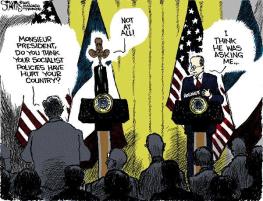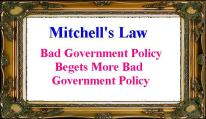For supporters of sensible policy, 2008 was not a good year. The economy suffered a big drop thanks to bad government policies (easy-money from the Federal Reserve and corrupt housing subsidies from Fannie Mae and Freddie Mac).
Sadly, they gave us another tragic example of Mitchell’s Law. In response the damage caused by one set of bad policies, they adopted another set of bad government policies (in this case, the TARP bailout and Keynesian “stimulus” schemes).
Quite predictably, bailouts and bigger government didn’t work. Either in the United States or elsewhere in the world.
But proponents of Keynesian economics never learn from their mistakes. They simply assert that their policies somehow would have worked if the government spent even more money and maintained profligacy over a longer period of time.
You may think I’m joking, but here’s another example of this phenomenon. According to a recent news report, a senior bureaucrat at the Organization for Economic Cooperation and Development says we can have more prosperity if politicians make government bigger – both today and tomorrow.
The chief economist of the OECD has urged governments not to rush to cut public spending deficits… Laurence Boone – who runs the Organisation for Economic Cooperation and Development’s Economics Department
– also said that political leaders should use fiscal policy to revive their economies… Boone said that governments had been correct to invest in stimulus packages during 2009: “The mistake came later in 2010, 2011 and so on, and that was true on both sides of the Atlantic,” she commented.
Needless to say, her analysis is wrong. If the answer is lots of spending over a long period of time, then why did the U.S. economy languish for an entire decade under the Keynesian policies of Hoover and FDR? And why has the Japanese economy languished for several decades when politicians on that side of the Pacific Ocean have imposed Keynesian policies?
Before pushing for another orgy of government spending, shouldn’t advocates of Keynesian economics be required to show us at least one success story for their approach, in any country and at any point in history?
Don’t hold your breath waiting for an answer.
By the way, before getting her sinecure at the OECD, Ms. Boone was an economic advisor to French President Francois Hollande.
That should have been a black mark. Hollande was the socialist who imposed confiscatory tax rates (resulting in effective tax rates above 100 percent for thousands of people) and drove entrepreneurs to flee the nation. Also, I can’t resist noting that Hollande copied Biden with the absurd assertion that higher taxes are “patriotic.”
 Though, to be fair, Hollande eventually decided to be merciful and limit any taxpayer’s overall burden to 80 percent. How merciful!
Though, to be fair, Hollande eventually decided to be merciful and limit any taxpayer’s overall burden to 80 percent. How merciful!
Anyhow, you would think anyone associated with Hollande’s disastrous tenure would have a hard time getting another job.
But to the statists in charge of hiring at the OECD, Boone’s association with failed socialists policies apparently made her the most attractive candidate.
P.S. Returning to the article cited above, Ms. Boone did make one sensible observation, noting that Keynesian easy-money policies push up asset prices, which mostly benefits the rich.
…governments propped up growth with monetary policy – slashing interest rates and pumping liquidity into the banking system. But Boone argued that monetary policy “has distributional impacts” – it can for example drive up asset prices, favouring the wealthy.
It’s great when people become rich by providing goods and services to the rest of us. It’s nauseating when people become rich because of bad government policy.
P.P.S. If governments follow Ms. Boone’s and expand the burden of government spending, it will be just a matter of time before they also impose higher taxes. But Ms. Boone won’t have to worry about that since OECD bureaucrats (like their counterparts at other international bureaucracies) get tax-free salaries.

